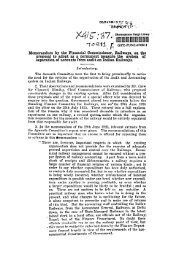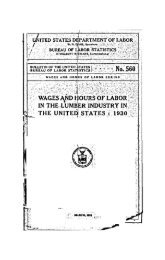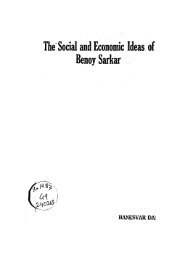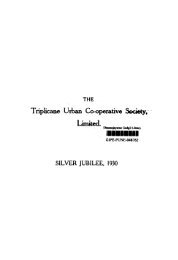Create successful ePaper yourself
Turn your PDF publications into a flip-book with our unique Google optimized e-Paper software.
_ ._~J~ul~Y_I_o_th~'~'9~2~S ________ ~JN~D~IA~N~O~P~I~N~I~O~N~ ______________ ~!_ 175<br />
< .' anll motOr-crcles• In short he placed the entire resources<br />
of h18 State at tRe disposal of the Viceroy<br />
T~e th~n Viceroy of India, Lord Hardinge said of<br />
hl.m: That !>ne can hardly epen the newspaper<br />
wIthout reading of some fresh instance of the<br />
,~~6i:1arajah's generosity"-and the papers are full<br />
of stories of his humanity. Whenever he came to<br />
London, he wonld, dreMed iu old clothes, slip out<br />
of his hotel ip the evening and board a 'bus and<br />
• pass the hours in riding round the city. London by<br />
night, seen froJll an omnibus top, fascinated him.<br />
A~ th~ pmt!, ~f a national rejoieing, he was in<br />
• LooQAJ,l,.y •. pnatt~4ed.he,mingled in the crowd at a<br />
firewor~.dlsplay"coming by chance upon a working<br />
l'DJ,ln and his wife with a child, which should<br />
ne~er have brought out on such a night. It had<br />
grown too tired to walk, it was carried by the man<br />
and sometimes by the woman. All three were tired<br />
ou~ The Maharajah offered help in carrying the<br />
cbdd. After a moment's hesitation the offer was<br />
accepted. The Maharajah stayed o';t the fireworks.<br />
with the child asleep in his arms. On the return<br />
journey, the Maharajah did his share of the work<br />
of carrying and on reaching the palotial house in<br />
Park Lane in which he was living, without thinking<br />
he stopped and said Goodnight to the pair adding<br />
that he had reached his home. The man e~ed him<br />
narrowly and indicated his disbelief. "Oh" said the<br />
1.1aharajah. "I'm only engaged in the stables"<br />
"Well" said the man, "you ain't our English sort, ~f<br />
C011rse, but you are a damn good fellow."<br />
In his own dominions he also loved to play<br />
Haronu-al-Raschid. Once after a night ramble in<br />
disguise he was returning to his place when he was<br />
challenged by a sentry. He explained who he was<br />
but his tail was not good enough for the soldier.<br />
The end of it.was that the Maharajah was kept in<br />
the'g1lllfdl'OOm till his ',private .secretary came.-land<br />
identified him. ' The sentry expected to be instan~ly<br />
beheaded. But the monarch pleased with his discipline,<br />
gave him a step un in rank!<br />
With the aid of an Irrigation Department, he enabled<br />
many thousands of barren acres of land being<br />
brought under cultivation. He was considered to<br />
be a benevolent ruler. He had a collection of<br />
jewels believed to be one of the finest in the world.<br />
He had a dozen ropes of pearls alone worth a million,<br />
But he preferred to go about unrecognised<br />
among his people in ordinary Indian dress.<br />
An error crept into a previous letter about the<br />
Maharajah of Jodpp.r. He is in England with his<br />
only Maharanee.<br />
The chief points in the Allied Note to Germany<br />
are: The Allied Governments consider it of capital<br />
importance to declare that the defaults in disarmament<br />
would if not promptly rectified, enable<br />
the German Government to reconstitute an army<br />
modelled on the principles of a nation of arms. The<br />
totality ot disarmament defaults is a serious menace<br />
to peace. It noW resta with the German Government<br />
to create the conditions in which evacuation<br />
of C1ologile can speedily be effected. It is they<br />
\~enlseJveft with 'profit by the readiness with which--<br />
.~e1 'give effect to the rectifications demanded. The<br />
\Ilie~ Governm.ents again. appeal earnestly to the<br />
German Government to liquidate with the necessary<br />
'goodwill the outstanding matters, the settlement of<br />
which the gravity of the situation demands.<br />
TO' teach pupils of forty nationalities in one<br />
secondary school is a task to fascinate the most<br />
ardent pedagogist. The experiment is to be made<br />
in Geneva for the heneJit of the families of the<br />
Secretariats of the League of Nations and the International<br />
LabOllr Office.<br />
English and French will<br />
be the teaching languages employed, the headmaster<br />
will be an Englishman, and the system adopted will<br />
be a combination of the lateat edueational methods<br />
of ' Europe al:d A.mari.<br />
M",. tJsl .. ' ell. mil" mJaohl •• whb wldob &)a., Ill. I<br />
generally credited lurks in the brain of apes and in<br />
a new bo?k, The Mentality of Apes, Prof~r W.<br />
Kohler glVtlS some remarkable instances of their<br />
cleverness. One Chimpanzee would pile boxes-On<br />
one another in order to reach some fruit· one day<br />
the Keeper offered his bent. back as a s~l, taking<br />
care to stoop too low to bnng the fruit in reach<br />
"whereupon the disappointed ape came quickl;'<br />
do~n and tried very en~~eti~IlY to raise the keeper<br />
mto a more erect potIltlon. _ -Another s"""imen<br />
"SaIl " ed t'~ ,<br />
y, ns to hand her teacher four straws when<br />
as~ed for that number. Clearly the expressio1l<br />
"brainless I!B Chimpanzee," used by the Cambridge.<br />
Poet, Calverley, was a gross slander. -<br />
MAHATMA GANDHI AND MR. FORD<br />
A STUDY IN CONTRAST<br />
1.1r. Arthur J. Penty writes in "G. K. Weekly" :<br />
Of all the prophets of our world to-day perhapa.<br />
the two most notable because the most extreme are<br />
Henry Ford and Mahatma Gandhi. Both of fuem<br />
are remarkable men, and yet they would lead the<br />
world in precisely opposite directions. Ford stand.s<br />
!or ~e externalisation, the mechanisation of life. It<br />
IS hIS boast that he has filled the streeta with motorcars.<br />
He is planning now, so I read, to fill the air<br />
w!th aeroplanes, and if he lives long enough he will<br />
WIthout a doubt fill the sea with submarines. At<br />
any rate, such would appear to be the logical outcome<br />
of his activities. To Gandhi all such attivities<br />
or developments are anathema. He does not talk<br />
about the D~ed of controlling machinery,-but is cont~nt<br />
~ sa~ represents a great sin." Machinery to<br />
hIm IS an mstrument of the devil essentially destructive.<br />
It is the wrecking force in society and<br />
_ ~erd~re. he ~eks to banish it from India precedent<br />
to llaDlshmg It from the world. There is to' be no<br />
compromise with it.<br />
Which of these two men is right. To answer this<br />
J question it is necessary to discuss other things in<br />
addition to machinery. It is necessary to come to<br />
conclusion about the final aims of life. But this is<br />
a big order about which it seems difficult for most<br />
people to reach any conclusion. Let us, therefore,<br />
seek to test by reference to some more proximate'<br />
idPal-say human eqnality. In his 'Autobiography'<br />
Henry Ford expresses himself very frankly on this<br />
point. He says:-<br />
"Repetitive labour-the doing of one thing over<br />
and over again and always in the same way-is a<br />
terrifying prospect to a certain kind of mind. It .is<br />
terrifying to me. I could not possibly do the same<br />
thing day in and day out, but to other mind.s, perhaps<br />
I might say to the majority of mind.s, repetitive<br />
operations hold no terrors. In fact some types of<br />
mind thought is absolutely appalling. To them the'<br />
ideal job is one where the creative instinct need not<br />
be exprePsed. The jobs where it is necessary to put<br />
in mind as well as muscle have few takers-we al- •<br />
ways need men who like a job because it is difficult.<br />
,The average worker,I am sorry_to ~y, wants a job<br />
in which ho does -not have to put forth much<br />
physical exertion above all, he wants a job in which<br />
he does not have to think. Those who have what<br />
may be called the creative type of mind and who<br />
thoroughly abhor monotony are apt to imagine that<br />
all other mind.s are similarly restless and therefore<br />
to extend quite unwarranted sympathy to the labouring<br />
man who day in and day out performs almost<br />
exactly the same kind of operation.<br />
REPETITIVE LABOUR<br />
Now is this true or is it false? I do not hesitate<br />
to say FortI's judgment is superficial. That there<br />
are great differences between men there is no denying.<br />
. One man's meat may be another man's poison,<br />
but there are sOme poil'(JQs that d~1 all men, and<br />
&Il. mtolwalgtloH 0& labout I. on. 0& thCMt, W.
















